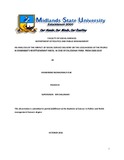Please use this identifier to cite or link to this item:
https://cris.library.msu.ac.zw//handle/11408/1952Full metadata record
| DC Field | Value | Language |
|---|---|---|
| dc.contributor.author | Kahwambo, Nonhlanhla R. W. | - |
| dc.date.accessioned | 2017-05-19T09:47:48Z | - |
| dc.date.available | 2017-05-19T09:47:48Z | - |
| dc.date.issued | 2016 | - |
| dc.identifier.uri | http://hdl.handle.net/11408/1952 | - |
| dc.description.abstract | During the period of 2000 to 2015, Zimbabwe has been characterized by the socio, economic and political crisis. From the Millennium, the government embarked on the fast track land resettlement program. The fast track land resettlement programme was defined by the GoZ as an elaborate plan for the Land Reform and Resettlement Programme Phase 2. The programme aimed at acquiring millions of hectares and settling thousands of families. The beneficiaries were to include landless poor and overcrowded families. This target was disastrous and believed to be the main cause of the economic meltdown. The economic crisis led to the rise of unemployment, rise in rentals and creation of squatter camps. The 2005 Operation Murambatsvina unleashed the humanitarian crisis by destroying homes, asserts and means of livelihood for thousands of people at a time were the economy was already struggling. Since the construction of houses could not be done overnight, the government set up transit camps and promised to act fast. However the government failed to provide the required basic needs at the camps and the conditions are well below international standards. The research was carried out in Caledonia farm located about 30km south east of Harare near the old suburb of Tafara. The main purpose of this research was therefore to explore and evaluate the provision of social services in this farm which havens thousands of people who are victims of the economic meltdown and the operation and to establish certain measures to strengthen the means of social service delivery in these resettlement areas. The researcher used a qualitative research method and instruments such as questionnaires, interviews, discussions and observations to collect data from participants in the research. The research findings reviewed that resettlement or transit camps are characterized with poor housing and health and educational facilities, poor infrastructural development and social protection. The results also reviewed that responsible authorities and delivery instruments lacks the capacity to contribute to the development of comprehensive social welfare. The area is prone to challenges such as the spread of diseases, decrease in educational standards, substandard housing and infrastructure and mainly the exposure to social risks. The development is hindered by factors such as inadequate policies and mainly but not least the little fiscal space. The research also reviewed that there is need for serious attention before the bomb explored. | en_US |
| dc.language.iso | en | en_US |
| dc.publisher | Midlands State University | en_US |
| dc.subject | Social service delivery | en_US |
| dc.title | An analysis of the impact of social service delivery on the livelihoods of the people in Zimbabwe’s resettlement areas. in case of Caledonia Farm, from 2000-2015 | en_US |
| item.fulltext | With Fulltext | - |
| item.languageiso639-1 | en | - |
| item.grantfulltext | open | - |
| Appears in Collections: | Bachelor Of Science In Politics And Public Management Honours Degree | |
Files in This Item:
| File | Description | Size | Format | |
|---|---|---|---|---|
| whitney_hahwambo_third_turnitin_upload 2.pdf | Full Text | 1.2 MB | Adobe PDF |  View/Open |
Page view(s)
152
checked on Mar 2, 2026
Download(s)
114
checked on Mar 2, 2026
Google ScholarTM
Check
Items in MSUIR are protected by copyright, with all rights reserved, unless otherwise indicated.



